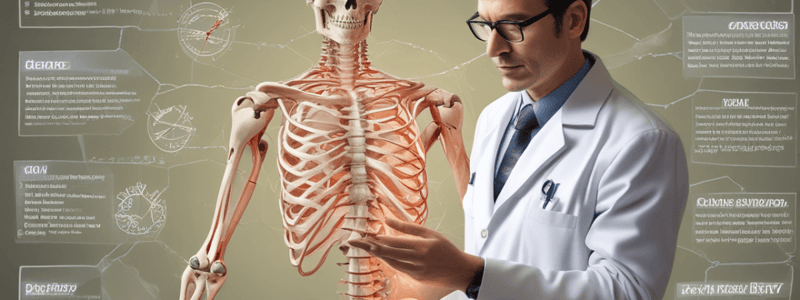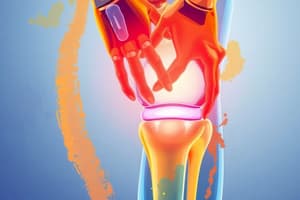Podcast
Questions and Answers
What is the term for joint pain with inflammation?
What is the term for joint pain with inflammation?
- Periarticular pain
- Articular pain
- Arthritis (correct)
- Arthralgia
Which type of joint pain involves 2-4 joints?
Which type of joint pain involves 2-4 joints?
- Polyarticular
- Asymmetrical
- Monoarticular
- Oligoarticular (correct)
What is the term for pain from soft tissue surrounding the joint?
What is the term for pain from soft tissue surrounding the joint?
- Articular pain
- Referred pain
- Periarticular pain (correct)
- Inflammatory pain
Which type of arthritis is characterized by a combination of redness, swelling, warmth, and/or tenderness?
Which type of arthritis is characterized by a combination of redness, swelling, warmth, and/or tenderness?
What is the typical presentation of tophi in gout?
What is the typical presentation of tophi in gout?
What is the term for a bacterial infection of the joint?
What is the term for a bacterial infection of the joint?
What is the term for a type of joint pain that affects both sides of the body?
What is the term for a type of joint pain that affects both sides of the body?
What is the purpose of the 2015 ACR-EULAR Gout Classification Criteria?
What is the purpose of the 2015 ACR-EULAR Gout Classification Criteria?
What is the gold standard for diagnosing gout?
What is the gold standard for diagnosing gout?
What is the characteristic appearance of monosodium urate crystals under microscopy?
What is the characteristic appearance of monosodium urate crystals under microscopy?
What is the primary role of serum uric acid levels in gout diagnosis?
What is the primary role of serum uric acid levels in gout diagnosis?
What is shown in the dual-energy CT image of the feet in a patient with tophaceous gout?
What is shown in the dual-energy CT image of the feet in a patient with tophaceous gout?
What is the main purpose of measuring serum uric acid in a patient with suspected septic arthritis?
What is the main purpose of measuring serum uric acid in a patient with suspected septic arthritis?
What is the significance of a positive PCR test in a patient with suspected septic arthritis?
What is the significance of a positive PCR test in a patient with suspected septic arthritis?
What is the significance of a WBC count of > 50,000 WBC/mm3 in synovial fluid analysis?
What is the significance of a WBC count of > 50,000 WBC/mm3 in synovial fluid analysis?
What is the purpose of performing arthrocentesis in a patient with suspected septic arthritis?
What is the purpose of performing arthrocentesis in a patient with suspected septic arthritis?
What is the significance of an elevated ESR and CRP in a patient with suspected septic arthritis?
What is the significance of an elevated ESR and CRP in a patient with suspected septic arthritis?
What is the significance of a medical emergency in septic arthritis?
What is the significance of a medical emergency in septic arthritis?
What is a complication of Rheumatoid Arthritis?
What is a complication of Rheumatoid Arthritis?
What is the goal of early diagnosis and early initiation of treatment in Rheumatoid Arthritis?
What is the goal of early diagnosis and early initiation of treatment in Rheumatoid Arthritis?
What is a characteristic of Rheumatoid Arthritis?
What is a characteristic of Rheumatoid Arthritis?
What is a consequence of a 12-week delay in treatment of Rheumatoid Arthritis?
What is a consequence of a 12-week delay in treatment of Rheumatoid Arthritis?
What is another possible diagnosis besides Rheumatoid Arthritis in Zain Mara's case?
What is another possible diagnosis besides Rheumatoid Arthritis in Zain Mara's case?
What is a common extra-articular complication of Rheumatoid Arthritis?
What is a common extra-articular complication of Rheumatoid Arthritis?
What percentage of people aged 65 and older have osteoarthritis?
What percentage of people aged 65 and older have osteoarthritis?
What is a characteristic of osteoarthritis onset?
What is a characteristic of osteoarthritis onset?
What is a common feature of osteoarthritis in the hands?
What is a common feature of osteoarthritis in the hands?
What is a risk factor for osteoarthritis?
What is a risk factor for osteoarthritis?
What is a characteristic of joint pain in osteoarthritis?
What is a characteristic of joint pain in osteoarthritis?
What is a common feature of advanced osteoarthritis?
What is a common feature of advanced osteoarthritis?
Flashcards are hidden until you start studying
Study Notes
Joint Pain Classifications
- Joint pain can be classified into inflammatory and non-inflammatory causes
- Inflammatory causes include septic arthritis, gout, and rheumatoid arthritis
- Non-inflammatory causes include osteoarthritis
Monoarticular, Oligoarticular, and Polyarticular Joint Pain
- Monoarticular: involving a single joint
- Oligoarticular: involving 2-4 joints
- Polyarticular: involving ≥ 5 joints
Inflammatory Arthritis
- Characterized by combination of redness, swelling, warmth, and/or tenderness
- Examples include septic arthritis, gout, and rheumatoid arthritis
Septic Arthritis
- Generally refers to bacterial infection of the joint
- Medical emergency that requires immediate diagnosis and urgent referral for treatment
- Evaluation includes complete blood count, erythrocyte sedimentation rate (ESR), C-reactive protein (CRP), serum uric acid, and arthrocentesis for synovial fluid analysis
- Management involves immediate diagnosis and urgent referral for treatment
Gout
- Evaluation includes clinical diagnosis, classification criteria, and microscopy-based diagnosis of synovial fluid
- 2015 ACR-EULAR Gout Classification Criteria can help inform the clinician but is not meant for diagnosis
- Serum uric acid levels can identify hyperuricaemia
- Gold standard for diagnosis is joint aspiration and microscopy analysis showing presence of monosodium urate crystals
Rheumatoid Arthritis (RA)
- Management involves low threshold for referral to rheumatologist
- Goals of treatment include early diagnosis and early initiation of treatment to prevent irreversible joint damage, achieve long-term clinical remission, optimize quality of life, and monitor for extra-articular complications
- Complications of RA include osteopenia and osteoporosis, lung manifestations, accelerated atherosclerosis, increased insulin resistance, vasculitis, thromboembolic disease, depression, anemia of chronic disease, and Felty syndrome
Osteoarthritis
- Prevalence increases with age, affecting 7.3% in ages 18-44, 30% in ages 45-64, and 50% in ages 65 and older
- Women are more commonly affected than men
- Other risk factors include overweight/obese, previous joint injury, family history, frequent bending/squatting, and repetitive impact
- Degenerative disorder of articular cartilage associated with hypertrophic bone changes
- Onset is gradual, and duration is lifelong with flares
- Typically, there is no morning pain or stiffness (or short-lived)
Osteoarthritis – Clinical Features
- Asymmetric joint pain and stiffness, commonly affecting hands, knees, hips, feet, and spine
- Joint pain worsened by movement/activity, especially following a period of rest
- Joint swelling and tenderness
- Bony enlargement in prolonged or severe OA
- Pain on range of motion and limitation of range of motion
- Crepitus (typically knee) may be felt and heard
- Bouchard nodes on proximal interphalangeal joint and Heberden nodes on distal interphalangeal joints
Studying That Suits You
Use AI to generate personalized quizzes and flashcards to suit your learning preferences.




